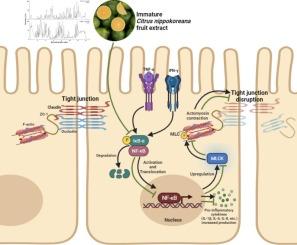Protective effects of immature Citrus nippokoreana fruit extract on TNF-α/IFN-γ-induced intestinal epithelial barrier disruption
IF 3.3
Q2 FOOD SCIENCE & TECHNOLOGY
引用次数: 0
Abstract
This study investigated the protective effects of immature Citrus nippokoreana fruit extract (CFE) against tumor necrosis factor (TNF)-α/interferon (IFN)-γ-induced barrier disruption in human intestinal epithelial cells. CFE demonstrated anti-inflammatory effects by suppressing the increased production of the proinflammatory cytokines interleukin (IL)-1β, IL-6, IL-8, and monocyte chemoattractant protein (MCP)-1. Moreover, CFE maintained barrier integrity, which was evidenced by its ability to prevent reductions in trans-epithelial electrical resistance (TEER) and increments in fluorescein isothiocyanate (FITC)-dextran permeability. The protective activity of CFE was supported by the preservation of the expression and localization of the tight junction proteins zonula occludens (ZO)-1, occludin, and claudin-1. CFE prevented nuclear factor (NF)-κB activation and translocation, myosin light chain kinase (MLCK) upregulation, and myosin light chain II (MLC-2) phosphorylation. The presence of flavonoids, namely didymin, sinensetin, eriocitrin, naringin, narirutin, and hesperidin, was confirmed in CFE. These findings indicate that CFE can serve as a protective agent for maintaining intestinal barrier integrity by suppressing inflammation and preserving tight junctions.

鲜柑桔果实提取物对TNF-α/IFN-γ诱导的肠上皮屏障破坏的保护作用
本研究探讨了柑桔未成熟果实提取物(CFE)对肿瘤坏死因子(TNF)-α/干扰素(IFN)-γ-诱导的人肠上皮细胞屏障破坏的保护作用。CFE通过抑制促炎细胞因子白细胞介素(IL)-1β、IL-6、IL-8和单核细胞化学引诱蛋白(MCP)-1的增加而显示出抗炎作用。此外,CFE保持了屏障的完整性,这可以通过其防止跨上皮电阻(TEER)的降低和异硫氰酸荧光素(FITC)-葡聚糖渗透性的增加来证明。CFE的保护作用是由于紧密连接蛋白ZO -1、occludin和claudin-1的表达和定位得以保存。CFE可抑制核因子(NF)-κB活化和易位、肌球蛋白轻链激酶(MLCK)上调和肌球蛋白轻链II (MLC-2)磷酸化。在CFE中证实了黄酮类化合物的存在,即双草胺、三叶草苷、苦皮苷、柚皮苷、narirutin和橙皮苷。这些发现表明,CFE可以作为一种保护剂,通过抑制炎症和保持紧密连接来维持肠道屏障的完整性。
本文章由计算机程序翻译,如有差异,请以英文原文为准。
求助全文
约1分钟内获得全文
求助全文
来源期刊

NFS Journal
Agricultural and Biological Sciences-Food Science
CiteScore
11.10
自引率
0.00%
发文量
18
审稿时长
29 days
期刊介绍:
The NFS Journal publishes high-quality original research articles and methods papers presenting cutting-edge scientific advances as well as review articles on current topics in all areas of nutrition and food science. The journal particularly invites submission of articles that deal with subjects on the interface of nutrition and food research and thus connect both disciplines. The journal offers a new form of submission Registered Reports (see below). NFS Journal is a forum for research in the following areas: • Understanding the role of dietary factors (macronutrients and micronutrients, phytochemicals, bioactive lipids and peptides etc.) in disease prevention and maintenance of optimum health • Prevention of diet- and age-related pathologies by nutritional approaches • Advances in food technology and food formulation (e.g. novel strategies to reduce salt, sugar, or trans-fat contents etc.) • Nutrition and food genomics, transcriptomics, proteomics, and metabolomics • Identification and characterization of food components • Dietary sources and intake of nutrients and bioactive compounds • Food authentication and quality • Nanotechnology in nutritional and food sciences • (Bio-) Functional properties of foods • Development and validation of novel analytical and research methods • Age- and gender-differences in biological activities and the bioavailability of vitamins, minerals, and phytochemicals and other dietary factors • Food safety and toxicology • Food and nutrition security • Sustainability of food production
 求助内容:
求助内容: 应助结果提醒方式:
应助结果提醒方式:


